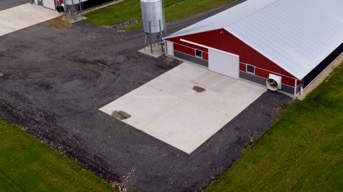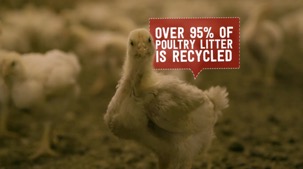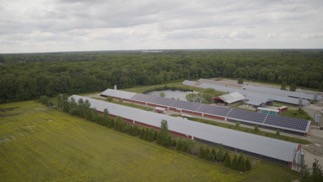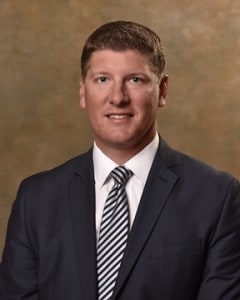How Chicken Farmers Reduce Waste, Emissions and Runoff
For chicken farmers, the wellbeing of the flock goes together with running an environmentally responsible and sustainable farm. The latest tech allows farmers to check for leaks in their waterlines, conserve energy usage, and flag potentially harmful ammonia levels. These efforts reduce waste, runoff and emissions.

Rachel Rhodes, like many chicken farmers, has installed concrete heavy use area pads at the entrance of each chicken house. These concrete pads allow for easier collection of chicken litter without any elements getting lost or spread into the ground. This litter is then composted and recycled to be used as a natural and organic fertilizer.

“It’s important for us to actually recycle the litter that’s generated in the poultry houses. It’s a commodity that has value,” shares Terry Baker. In fact, over 95% of poultry litter is recycled. You can learn more about how poultry litter is recycled here.

Vegetative buffer systems made of grass or other shrubs help to absorb water, limiting erosion and runoff on chicken farms. Buffers positioned by the fans of the chicken house serve to capture air emissions. “Those grasses help with any type of air pollutant that could come out of the chicken house,” says Rachel.

Using computer technology, farmers like Terry Baker can track gas levels in their chicken house, like ammonia, from a smartphone. “We are cognizant of keeping the environment clean and ammonia levels low. So, we can have healthy, happy, chickens.” Keeping tabs on ammonia levels keeps the environment in the house safe for the chickens and reduces the farm’s footprint.
“My farm is right here on my home. I raise my children right here,” says Janice Vickers. “Just like everybody else, I want to keep the environment clean and friendly and work for everybody.”
Want to learn more about what farmers are doing to run sustainable farms? Check out Tim and Deena’s story.
Meet the author, Tom Super, Senior Vice President of Communications at the National Chicken Council.
Super brings over 20 years of combined experience in strategic communications, public policy, politics and meat and poultry issues management to NCC’s senior management team. He is responsible for day-to-day media relations, media outreach, social media management and strategic communications planning to supplement the National Chicken Council’s legislative, regulatory and public affairs efforts.
Prior to his joining the National Chicken Council, Super spent three and a half years at the American Meat Institute, most recently as vice president of public affairs. He previously spent six years at Greener and Hook LLC, a Washington-based strategic communications consulting firm where his focus was on planning and executing communications strategies and delivering strategic communications and media relations counsel to corporations, trade associations, ad-hoc organizations, non-profits and political candidates at the local, state and federal levels. Super began his career in Washington, D.C. on Capitol Hill as a press assistant and legislative correspondent for U.S. Senator John W. Warner (R-Va.).
A graduate of Washington & Lee University, in Lexington, Va., Super earned his bachelor of arts degree in public policy.
